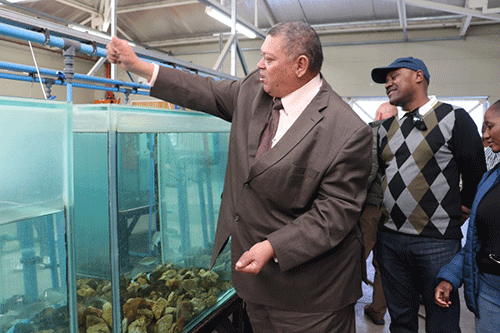RUNDU – Government’s freshwater aquaculture initiative has not lived up to expectations.
Fisheries minister Derek Klazen last Tuesday, during the opening of the aquaculture and inland fisheries internal consultation and strategic planning meeting, said marine aquaculture performed better with an average production of 450 tons of shellfish while freshwater aquaculture on average produced 35 tons of fish per annum.
“Marine aquaculture performed better with 280 jobs per annum, mostly because of private participation and interest,’’ said Klazen.
The minister was in Kavango East last week to attend the consultation and strategic planning meeting which was convened to iron out the challenges faced by the industry.
“Having so many educated people, we need to move forward with our fishing, especially on aquaculture and mariculture. I am pleased that this meeting will come up with practical solutions and roadmap,’’ he noted.
The minister stated that the master plans that were launched in 2016 for aquaculture, identified most of the obstacles in this sector.
“I am convinced that we are professionals with the capacity to address the challenges facing the sector. From a layman’s point of view, there might be many questions from the communities, which we need to answer concerning the investment the government has made in this sector so far. I remain acutely aware of the fact that inland or freshwater fisheries may not produce the same quantity of fish as the marine fishing sector,” he said.
“Sadly, the decline in landings from the inland fishery resource systems from 2010 to the current landings is alarming. I am informed that the drop in our current landings is caused by various factors, chiefly amongst these, overfishing. As such, we as a collective urgently and decisively need to identify interventions to solve overfishing, as commercial fishing increased since 2010,” he noted.
Klazen said there was a need to take stock and strive to find solutions to the problems of aquaculture and inland fisheries sectors, noting that government recognises the importance of such sectors.
“In terms of its importance to food and nutritional security, and its contribution to job creation and income generation at household level, we are struggling to make fish grow faster.
I heard this morning that it’s in the pipeline to make fish grow faster because the faster the fish grows the sooner it can be made available for consumption,’’ he said.
Since 2002, the government made a commitment through the promulgation of the Aquaculture Act, 2002 (Act No. 18 of 2002), regulations and policies to sustainably develop the aquaculture sector in addition to sustainable use of inland fisheries resources for food security at household level.
The minister and his delegation visited the Kamutjonga Inland Fisheries Institute (KIFI) in Mukwe constituency and the Mpungu Fish Farm in Kavango West.
– jmuyamba@nepc.com.na



